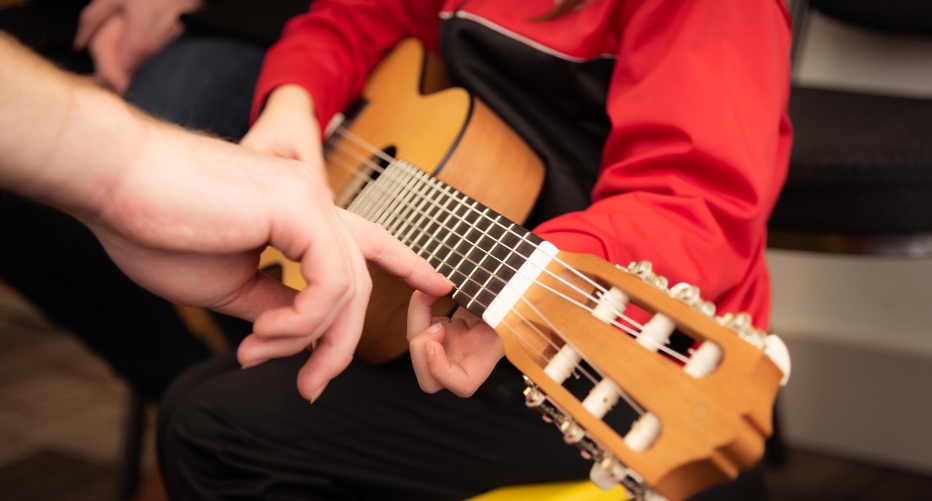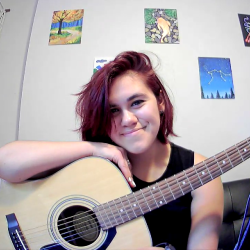“I cannot say enough great things about Powers Music School. Over the past 10 years, my special needs daughter has had the honor of participating in the music therapy program. Every teacher has been very impressive in their ability to bring out the best in Michaela and hone her skills as a singer. Her vocal capabilities have skyrocketed as a result.”
– Elise Moore, parent of music therapy student
We know not all students fit the traditional teaching methods of private lessons, so if you’re searching for a music program with the “right fit,” we might be able to help. Our Music Therapy program builds a nurturing, flexible, and judgment-free learning environment with specially trained therapists and teachers to adapt to students’ particular needs and abilities and meet their musical and non-musical goals.
Think of our department as a range of options. All of the lessons offered through the Music Therapy Department use an evidence and strength based approach that is uniquely tailored to each student. On one end, we can use music as a therapeutic tool to help you work towards a personal non-musical goal (also known as “music therapy”). On the other end, we can help you pursue your passion for music in a supportive, adaptive setting that helps guide you towards achievable, meaningful progress (we call these “modified lessons”). Many of our students do both, or even shift between the two, depending on the day! Anything is possible here.
Who is a good candidate for modified lessons or music therapy?
Our friendly, board-certified, music therapists are trained to support children, teens, or adults with any of the following:
- intellectual and developmental disabilities
- neurodivergent learning styles (including Autism, ADHD, etc.)
- cerebral palsy, Down Syndrome
- at-risk youth
- language delays
- IEPs (Individualized Education Plans)
- individuals struggling with identity
- veterans, first responders, or others struggling with traumatic stress disorders
- traumatic brain injuries
- emotional-regulation disorders
- sensory integration disorders
- Alzheimer’s, Dementia, and other aging-related disorders
- Hearing and visual impairments
- other complex medical issues
We can also opt for in-home services on a case-by-case basis if you have a physical disability and are unable to come to Powers.
Site Information:
All studio spaces at Powers Music School currently require students to go up a short flight of stairs to access the main floor of the school. However, Powers is committed to improving access to our building for those with limited mobility. The school is in the early stages of this large and important project but there is no formal timeline set for when it will be started/completed as of yet.
What will the year be like?
Every student and every lesson is different! After your phone consultation and trial with our Director of Music Therapy, Cheyenna, she can help you decide whether music therapy, modified lessons, or a combination of approaches will be the best route.
Some things we do in lessons include playing percussion, vocal exercises, piano, guitar, or ukulele instruction, song-writing, or even listening to preferred music on an iPad or electronic device.
In all cases, our program helps each student increase self-confidence, self-expression, independence, and the ability to adapt to new situations. Some other areas that music therapy and Modified Lessons can support students in include, but are not limited to:
- Daily living skills
- Language and communication
- Fine and gross motor skills
- Socialization
- Attention to task
- Promoting wellness
- And many more
At the end of the year, students have the opportunity to showcase their hard work and talent at a recital for their family and peers. Both students and caretakers will notice how much they’ve progressed on the path towards their personal and musical goals, and ultimately, towards discovering their self-worth.
Want to talk to someone or give it a try?
Anyone can request a Music Therapy Assessment Session through Powers Music School! An assessment session involves an intake phone call and 30-minute live session with our Director of Music Therapy, after which the student/guardian receives a Music Therapy Assessment Report outlining recommendations. The complete assessment process is a flat rate of $75.
To arrange for a phone call and trial lesson with our Director of Music Therapy, click here to tell us more about yourself:
Lesson information and tuition
Our group programs run based on interest and instructor availability. Please fill out the interest form above if you’re interested in one of our group programs, and we’ll let you know when we expect the next class to run! Possible group classes include:
Are you a college student completing a degree in music therapy?
Read about our music therapy internship opportunity here!
Frequently Asked Questions
What is Music Therapy?
Music therapy is the clinical and evidence-based use of music interventions to accomplish individualized goals within a therapeutic relationship by a credentialed professional who has completed an approved music therapy program.
It is the use of music in a therapeutic setting to support individuals to reach their highest personal potential through meaningful musical experiences. Music therapy is an evidence-based health profession with a strong research foundation, conducted always by a Board Certified Music Therapist (MT-BC).
For more information about what music therapy is, visit the website for the American Music Therapy Association (AMTA).
What’s the difference between music therapy and modified lessons?
In the most basic terms, music therapy is for students looking to work on non-musical goals, while modified lessons are for those looking to work primarily on musical goals.
During music therapy sessions, music is the tool that is being used to help improve a different area, as opposed to learning how to play an instrument. For example, a student with cerebral palsy with left sided weakness might be using the drum set as the main motivation tool to work on motor skills and bilateral coordination, so their lessons are focused on making the movements and developing that strength, not on learning complex rhythmic patterns and full songs.
On the other hand, modified lessons are focused on developing musical skills, like reading notation, playing an instrument, or learning to sing a song. The modified aspect of that lesson is how the structure or materials are adapted to best support the student’s success. Some examples of these modifications include adapting notation for someone with a visual impairment that makes reading standard musical notation extremely difficult or impossible, or adding in planned break times for students with ADHD that can’t focus for an hour straight.
Who is a Music Therapist?
Music therapists are highly trained professionals who undergo years of education and preparation.
Though we hear the term “music therapy” bandied about on the web and in the media, a qualified music therapist, at entry level, has a music therapy degree and includes 1200 hours of clinical training. Music therapy degrees combine fieldwork embedded in music therapy courses and a 6-9 month internship after the completion of all coursework. The national exam is administered by the Certification Board for Music Therapists (CBMT). In the United States, all music therapists must be board certified by CBMT and will carry the “MT-BC” credential.
There are roughly 10,000 Board Certified Music Therapists in the US.
What does it mean to be “board-certified”?
Our music therapists are trained in areas like psychology, child development, music therapy practices, and a wide range of diagnoses. This enables them to pull from many different methods and adapt the program specifically to each student’s learning style and level. They must have completed a bachelor’s degree or its equivalent in music therapy, a 1,040 hour clinical internship, and passed the board certification exam maintained by the Certification Board for Music Therapists (CBMT). They must also re-certify every five years by completing 100 continuing education credits overseen by the CBMT.
Do you take insurance for services?
Powers Music School does not currently take insurance reimbursement and we do not deal directly with insurance companies.
However, students can request a “superbill” that outlines all of the relevant information (session dates, payment information, CPT codes, and provider’s name, credentials, and NPI number) for sessions received. This superbill can be submitted to an insurance company with a request for reimbursement, but, unfortunately, reimbursement is not guaranteed and may require a physician’s referral.
Music therapists across the state, and country, are continuously working to gain more legal recognition of the value of music therapy through state licensure and other advocacy efforts. These efforts will hopefully make music therapy even more accessible, specifically by improving the ability to bill through insurances, in the near future!



